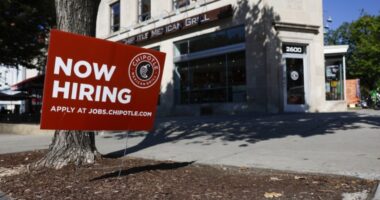“We’re definitely seeing more homelessness, more housing disruption, as a result of these disasters,” said Steve Berg, programs and policy director at the Washington-based National Alliance to End Homelessness.
Climate change didn’t directly cause the Midwest derecho last year or any of those other disasters. Scientists are clear, however, that a warmer planet makes extreme weather more likely and more ferocious. For people experiencing homelessness, like Domer, the storms make matters only more difficult. Others are made homeless. In both cases, government agencies and nonprofits provide support, but increasingly the needs exceed their capacity.
Together, these experiences constitute a grim warning that the climate emergency is here already, draining resources and devastating lives.
There are an estimated 580,000 people experiencing homelessness in America, based on a single-night count in January 2020 — the fourth straight year homelessness had increased, according to a study released last month by the Department of Housing and Urban Development. It was the first year since HUD began collecting data that the number of homeless people with children had gone up. And, as usual, people of color remained starkly overrepresented compared with the U.S. population overall.
Crucially, that’s all pre-pandemic data, and the reality is likely to be worse than we know. Millions lost work because of Covid-19, and even as the economy recovers, there remain 8.4 million fewer jobs than before the pandemic hit. Eviction moratoriums have helped, advocates say, but as some of those expire soon, the situation could grow more dire still.
The homeless population in Cedar Rapids numbers in the hundreds. It’s a far cry from the tens of thousands in larger cities, like Los Angeles, but the derecho’s lingering impact here is a microcosm of the various crises that can befall homeless groups in the aftermath of extreme weather.
When the windstorm finally did let up, about 45 minutes after it had begun, Domer’s campsite was in tatters: tents ruined, stoves and lanterns simply gone and just about everything else soiled with wet grime.
What struck Domer most, however, was the quiet. Gone were the normal afternoon sounds of the city. Even the nearby corn processing plant, a reliable source of ambient churning, was silent.
“I realized the whole town had been hit, and I thought, ‘Oh, my God,'” Domer said.
The derecho swept across multiple states that day, leaving widespread and often severe damage in its wake. The Cedar Rapids area fared worst, with winds reaching 140 mph, the equivalent of a Category 4 hurricane. Two-thirds of the city’s famously lush tree canopy was gone, much of it displaced onto streets and homes. And the power was out. In some parts of town, it would be weeks before it returned.
For the homeless, natural disasters prove torturous for more than the obvious fact that it’s worse to be outside than inside during a storm.
Only one-quarter of the homeless population is considered “chronically homeless,” meaning homeless for more than a year or experiencing repeat bouts of homelessness. At any given time, then, the vast majority of homeless people, including some who are chronically homeless, are scraping their way back toward stability. After disasters, backslide is all but inevitable.
Encampments are destroyed. Resources, often hard-won, are lost. If infrastructure is damaged, a job might become more difficult or impossible to get to.
Furthermore, many people who are homeless wrestle with untreated medical or mental health conditions that disasters might worsen. Domer, who suffers from post-traumatic stress disorder, said the derecho triggered substantial anxiety and depression, which she’s still coping with. Christian Murphy, who was also on the riverbank during the storm, said he worries that Cedar Rapids’ devastated tree stock will lead to lower air quality, complicating trouble he has already with breathing.
After the derecho, a short distance from Domer’s and Murphy’s encampment, Kari Fisher surveyed the damage to the duplex where she lived with her husband and six children, ages 1 to 10.
When the storm hit, Fisher had been home-schooling, a new responsibility due to the pandemic but one she enjoyed. Structural damage to the home was clear; in the unit opposite Fisher’s, a tree had smashed into the kitchen. City officials declared the home unfit for habitation, but with nowhere else to go, Fisher’s family stayed. Power was shot for good, so for months they got by using plastic coolers and a propane camping stove. (Thanks to the downed trees, Fisher jokes, they also had plenty of wood.)
In November, police cited the family for unlawful habitation. (Fisher is fighting the citation; she faces possible jail time, even though the family had continued to pay rent.) They were directed to Willis Dady, a homeless services nonprofit, which moved the family into a Hampton Inn & Suites north of town, using federal emergency funds made available to the city.
Fisher expected they’d be there for a couple weeks. Six months later, fully eight months on from the derecho, they’re stuck. In two hotel rooms, it’s Fisher, her husband, an ex-husband who has a disability, seven children — Fisher gave birth to a boy in February — and two dogs. In the same Hampton Inn & Suites, there are dozens more like Fisher, and it’s not the only hotel in town still housing people made homeless by the storm.
“It feels like sardines,” Fisher said. “It’s not sustainable.”
While her husband works, Fisher spends days searching Zillow, Zumper, Craigslist and Facebook Marketplace for available homes. On rental application fees alone, the family has spent $4,500 — dipping ever further into diminished savings — but nothing comes through. With so many people looking, prices are high. By the time most units are listed, they’re already gone.
“We’re in a hole,” Fisher said. “No matter how much I do, no matter how many phone calls I make, we’re still here.” Her “worst nightmare” is that the money supporting their hotel stay will run out before the family finds new shelter.
Source: | This article originally belongs to Nbcnews.com











